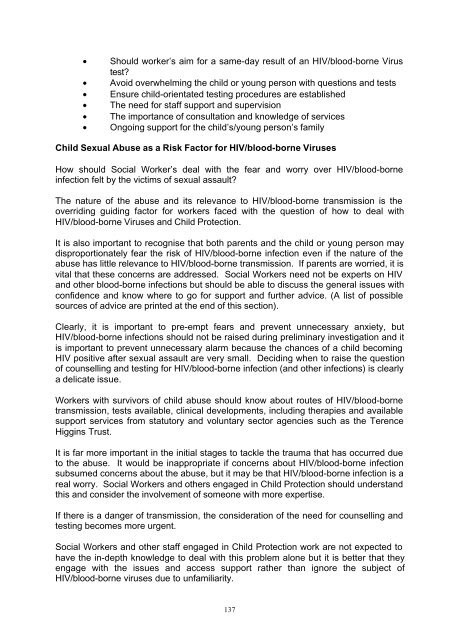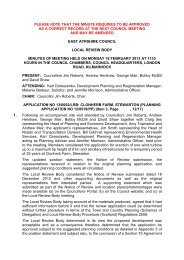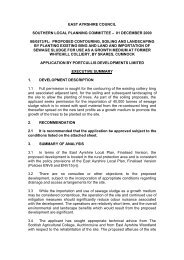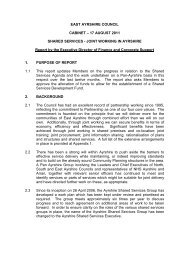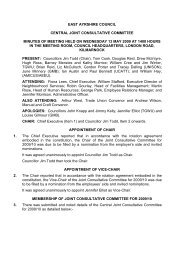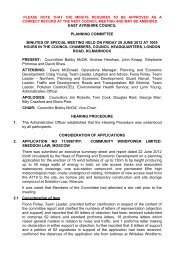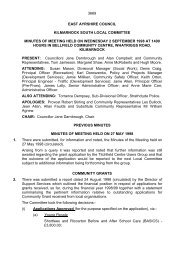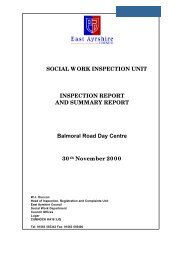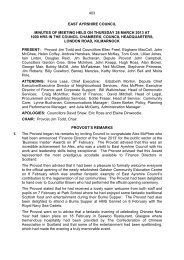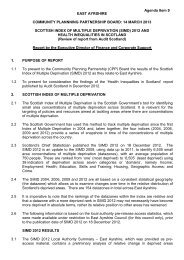Child Protection Procedures - East Ayrshire Council
Child Protection Procedures - East Ayrshire Council
Child Protection Procedures - East Ayrshire Council
You also want an ePaper? Increase the reach of your titles
YUMPU automatically turns print PDFs into web optimized ePapers that Google loves.
• Should worker’s aim for a same-day result of an HIV/blood-borne Virus<br />
test?<br />
• Avoid overwhelming the child or young person with questions and tests<br />
• Ensure child-orientated testing procedures are established<br />
• The need for staff support and supervision<br />
• The importance of consultation and knowledge of services<br />
• Ongoing support for the child’s/young person’s family<br />
<strong>Child</strong> Sexual Abuse as a Risk Factor for HIV/blood-borne Viruses<br />
How should Social Worker’s deal with the fear and worry over HIV/blood-borne<br />
infection felt by the victims of sexual assault?<br />
The nature of the abuse and its relevance to HIV/blood-borne transmission is the<br />
overriding guiding factor for workers faced with the question of how to deal with<br />
HIV/blood-borne Viruses and <strong>Child</strong> <strong>Protection</strong>.<br />
It is also important to recognise that both parents and the child or young person may<br />
disproportionately fear the risk of HIV/blood-borne infection even if the nature of the<br />
abuse has little relevance to HIV/blood-borne transmission. If parents are worried, it is<br />
vital that these concerns are addressed. Social Workers need not be experts on HIV<br />
and other blood-borne infections but should be able to discuss the general issues with<br />
confidence and know where to go for support and further advice. (A list of possible<br />
sources of advice are printed at the end of this section).<br />
Clearly, it is important to pre-empt fears and prevent unnecessary anxiety, but<br />
HIV/blood-borne infections should not be raised during preliminary investigation and it<br />
is important to prevent unnecessary alarm because the chances of a child becoming<br />
HIV positive after sexual assault are very small. Deciding when to raise the question<br />
of counselling and testing for HIV/blood-borne infection (and other infections) is clearly<br />
a delicate issue.<br />
Workers with survivors of child abuse should know about routes of HIV/blood-borne<br />
transmission, tests available, clinical developments, including therapies and available<br />
support services from statutory and voluntary sector agencies such as the Terence<br />
Higgins Trust.<br />
It is far more important in the initial stages to tackle the trauma that has occurred due<br />
to the abuse. It would be inappropriate if concerns about HIV/blood-borne infection<br />
subsumed concerns about the abuse, but it may be that HIV/blood-borne infection is a<br />
real worry. Social Workers and others engaged in <strong>Child</strong> <strong>Protection</strong> should understand<br />
this and consider the involvement of someone with more expertise.<br />
If there is a danger of transmission, the consideration of the need for counselling and<br />
testing becomes more urgent.<br />
Social Workers and other staff engaged in <strong>Child</strong> <strong>Protection</strong> work are not expected to<br />
have the in-depth knowledge to deal with this problem alone but it is better that they<br />
engage with the issues and access support rather than ignore the subject of<br />
HIV/blood-borne viruses due to unfamiliarity.<br />
137


